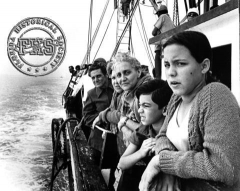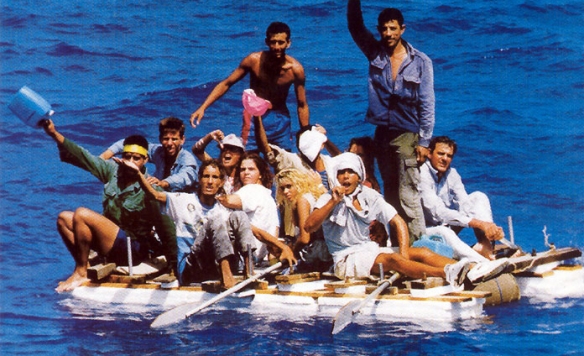
The Interests Section of Cuba in Washington D.C. has called the first National Meeting of Cuban Residents in the United States of America for April 28, which will involve a representation of Cubans who are “linked to their country in a respectful manner, aware of the urgency to defend its sovereignty and national identity.” This quote, taken from the meeting notice, is part of the process of normalizing relations with the country of emigration.
It is good to remember that throughout the history of Cuba, since the first settlers who arrived through the arc of the Antilles, to the tens of thousands Europeans, Asians and West Indians who came in the first half of the twentieth century, there was an immigration flow that, due to the loss of civil and political rights, the failure of wages relative to the cost of living, and the dispute with the United States, was transformed into a diaspora beginning in 1959.
Mass migration, negative effects
This migration, which began with the departure of people linked to the ousted regime — unlike the mass migrations that respond to a temporary crisis the process continued over time — and was followed by some 14,000 children who, under Operation Peter Pan, fled in planes and boats, until the lack of freedoms and the economic downturn caused the first mass exodus from the port of Camarioca in 1965 and the so called “freedom flights,” through which about 260,000 Cubans fled the country.
In April 1980 came the second mass stampede when thousands of Cubans stormed the Peruvian Embassy in Havana to seek refuge, an action that culminated with the release of another 125,000 thousand citizens through the port of Mariel in what became known, in the United States, as the “Mariel Boatlift.” In the summer of 1994, after assaulting the residences of the ambassadors of Belgium and Germany and the Consulate of Chile, and a mass protest in Havana, tens of thousands more fled.
This mass migration has had several negative effects for the country, among others, a population decrease, which has turned Cuba into the only American nation with a declining population and whose rate of departure in the next 24 years points to a critical reduction, particularly of young people, which is turning the island into a country of the elderly; and in the decapitalization of professionals because of the tens of thousands of doctors, engineers, lawyers, technicians and skilled workers who seek fulfillment in other places.

Return to inclusive policies
Until now, the government has considered that the presence of the Cuban diaspora in the country endangers the Revolution, the Fatherland and Socialism, which explains the mechanisms for the control of those who decided to leave. The exit and entry permit, the regulation of length of stay abroad, the seizure of personal and real property, and the exclusion from the nation, are among the exclusionary measures and violations of human rights.
However, the results obtained by Cubans abroad, the knowledge gained in administrative practices, the financial resources and other types of assets, together with family ties and a longing for their country, have converted the diaspora into a part of the solutions that Cuba needs.
History shows that violence has been the most commonly used response to conflicts, but it also demonstrates that conflicts are not resolved until submitted to dialogue and negotiation. The government of Cuba, according to sociologist Peggy Levitt and anthropologist Nina Glick, “treats its immigrants as if they did not belong to the country and often has branded them as traitors.” In addition, they do not recognize dual citizenship and other rights which reinforce the sense of belonging.
From a false and exclusionary vision, the Cuban government invited Cubans of the diaspora to “dialogue” in 1978 through the “Nation and Emigration” conferences, held in Havana, whose purpose was not the normalization of relations, but the collection of currency and seeking of support in the dispute with the United States. However, until now it has refused to move towards normalization of relations.
Carlos Saladrigas, president of the Cuba Study Group, explained that, although members of the historic exile constitute the majority of the Cuban-American citizens entitled to vote and made up the social group with greater buying power, as well as those who controlled the media in South Florida, a long process of change had occurred in some exiles, who had come to abandon the attitude of permanent confrontation.
In short, after more than half a century of physical and verbal violence, the exclusion of the diaspora — in violation of 16 of the 30 articles of the Universal Declaration of Human Rights — must end. For this to happen, Cubans in the exterior would have to have to right of dual citizenship, and the current laws of the Island would have to be brought in line with internationally established principles on migration, such that citizens, regardless of where they live, could participate in the affairs of the nation. This would help the economic reforms currently being implemented to have a greater chance of success.
Without these changes in conduct and policies, the call for the First National Meeting of Cubans Resident in the United States would be nothing more than another new episode in the old intention to consider the diaspora as a means to support the regime, without reintegrating their rights as Cubans. It would, like those that previously took place in Cuba, be exclusionary and so contrary to the interests of the nation, which consists of all Cubans, inside and outside.
Any call, in order to respond to the interests of Cuba, must be based on an inclusive dialog, that permits an analysis of the past, the present and the future relations between the diaspora and the nation. Dialog should be promoted as a starting point, as a guiding principle, and as a permanent strategy, which requires, as Carlos Saladrigas expressed, that we all change.
Cuba must open itself to the diaspora and the diaspora to Cuba. Cuba has to respect the rights of all its children, a respect missing in the call of the Interest Section of Cuba in Washington.
Originally published in Diario de Cuba
2 March 2012
